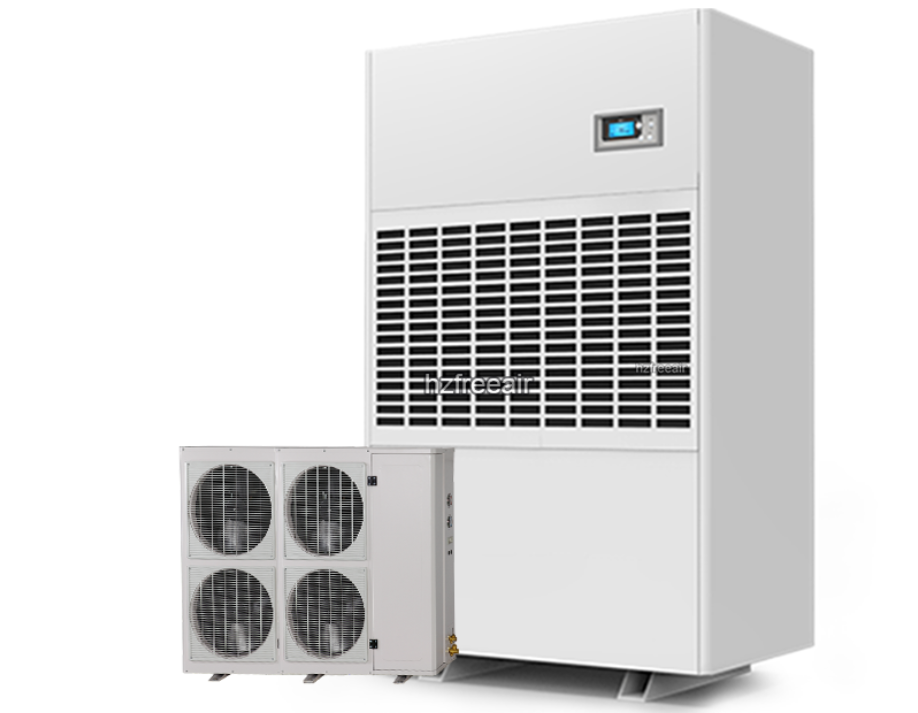


In modern industrial production, a stable temperature environment is crucial for equipment operation, product quality, and employee comfort. Industrial split-type air conditioning, with its high efficiency, energy saving, flexible installation, and stable performance, has become the preferred temperature control solution for many enterprises. This article will delve into the characteristics, advantages, and application scenarios of industrial split-type air conditioning.
What is an industrial split-type air conditioner?
An industrial split-type air conditioner consists of an indoor unit and an outdoor unit, connected by refrigerant pipes to achieve cooling or heating functions. Unlike central air conditioning or integrated air conditioners, the split design makes it more flexible to install and suitable for various industrial environments of different sizes.

The core advantages of industrial split air conditioners
1. High efficiency and energy saving, reducing operating costs
Industrial split air conditioners adopt advanced variable frequency technology, which can adjust the operating power according to actual needs, avoiding energy waste. Compared with traditional air conditioning systems, their energy efficiency ratio (EER) is higher, and long-term use can significantly reduce electricity expenses.
2. Flexible installation, suitable for different scenarios
Due to the split design, the indoor unit can be flexibly installed in different areas such as workshops, warehouses, or offices, while the outdoor unit can be placed on the roof or on the ground, saving space. This modular structure is particularly suitable for factory renovations or local temperature control needs.
3. Stable and durable, suitable for harsh environments
Industrial split air conditioners are made of high-strength materials and have dust-proof, corrosion-resistant, and high-temperature-resistant properties. Even in industrial environments with high dust and humidity, they can operate stably and extend equipment lifespan.
4. Precise temperature control, improving production efficiency
Many industrial production processes (such as electronic manufacturing, pharmaceutical production) have strict temperature requirements. Split air conditioners can precisely regulate temperature, ensuring a constant production environment and reducing product defects caused by temperature and humidity fluctuations.
5. Low noise operation, improving working environment
The compressor of industrial split air conditioners is placed outdoors, effectively reducing indoor noise, providing employees with a more comfortable working environment, and improving production efficiency.
Application scenarios of industrial split air conditioners
Manufacturing: Cooling of workshops such as mechanical processing and automotive assembly
Logistics warehousing: Temperature control of cold storage and constant temperature warehouses
Electronic industry: Constant temperature and humidity environment in precision instrument production workshops
Food and medicine: Temperature control requirements in line with hygiene standards
Data centers: Heat dissipation management in server rooms

How to choose the right industrial split air conditioner?
Calculate the cooling capacity: Select the appropriate capacity based on the area of the factory building, heat generated by equipment, and other factors.
Consider energy efficiency ratio: Choose high-energy-efficiency models to reduce long-term operating costs.
Environmental adaptability: Take into account special requirements such as dust prevention and corrosion resistance.
Brand and service: Choose a reputable brand to ensure after-sales maintenance support.
Conclusion
Industrial split-type air conditioners, with their features of energy efficiency, flexible installation, stability and durability, have become the ideal choice in the field of industrial temperature control. Whether in large factories or precision workshops, the rational configuration of split-type air conditioners can significantly improve the quality of the production environment and help enterprises reduce costs and increase efficiency. In the future, with the development of intelligent technology, industrial air conditioning systems will be more energy-efficient and environmentally friendly, providing stronger support for the sustainable development of the industry.